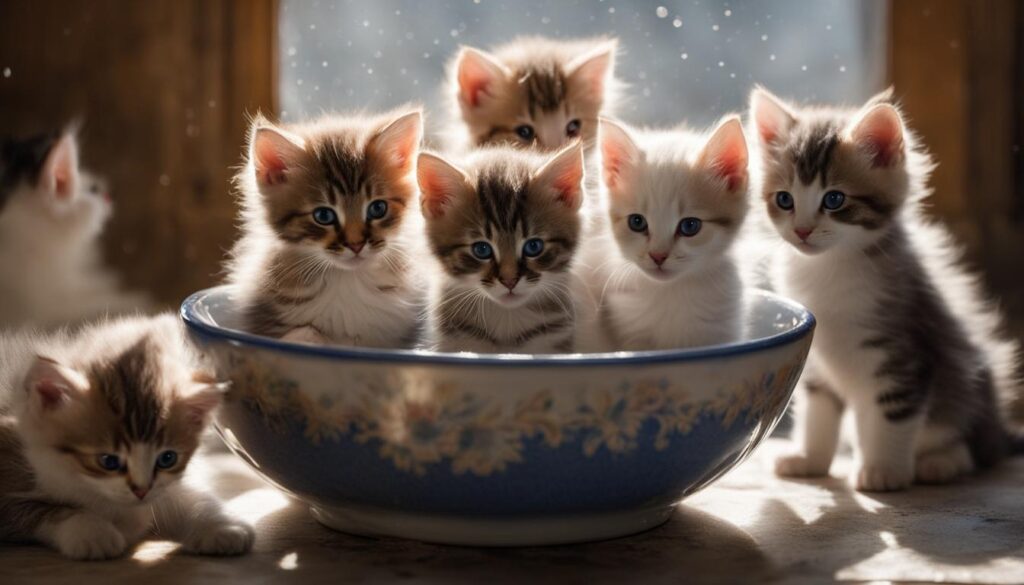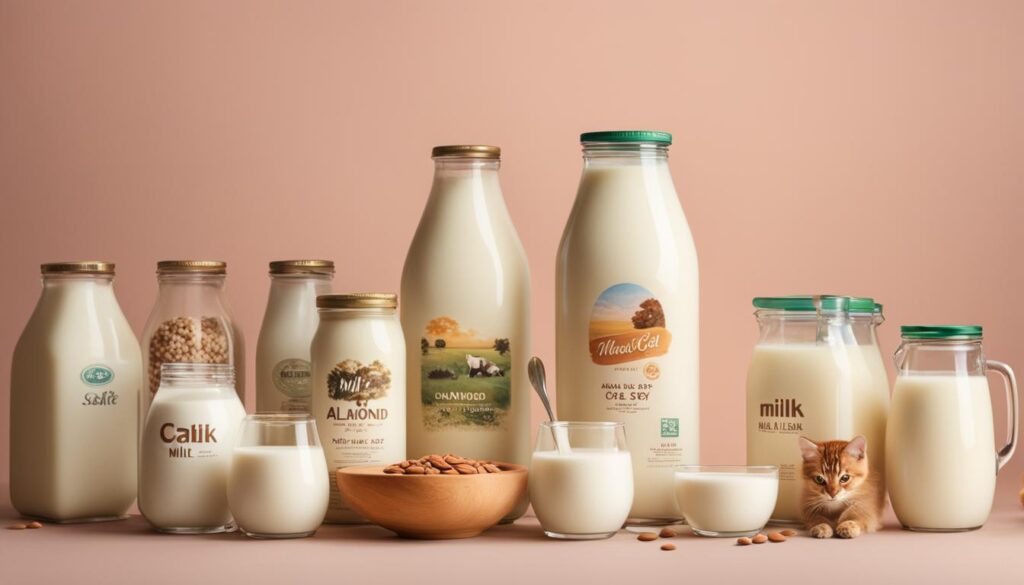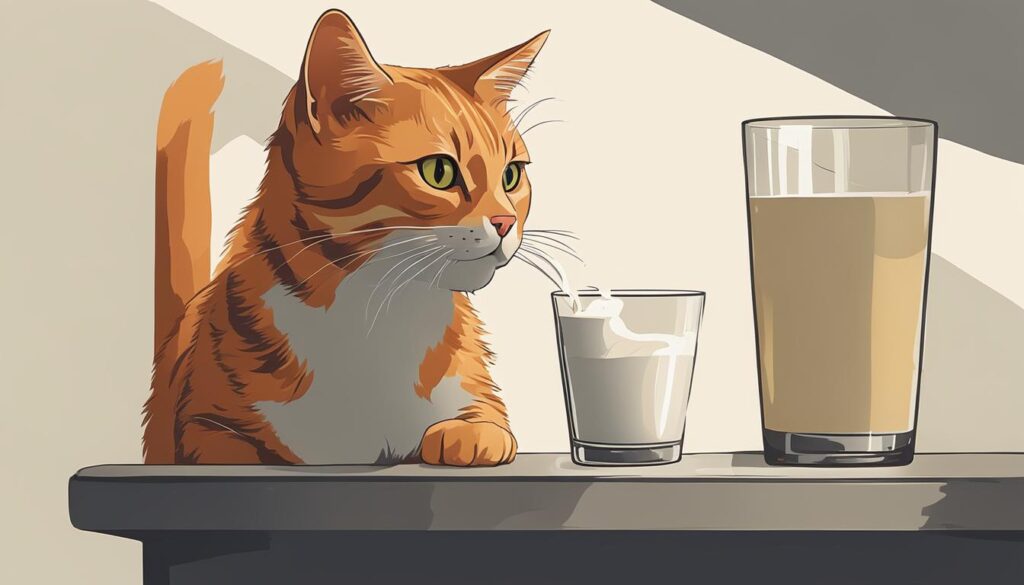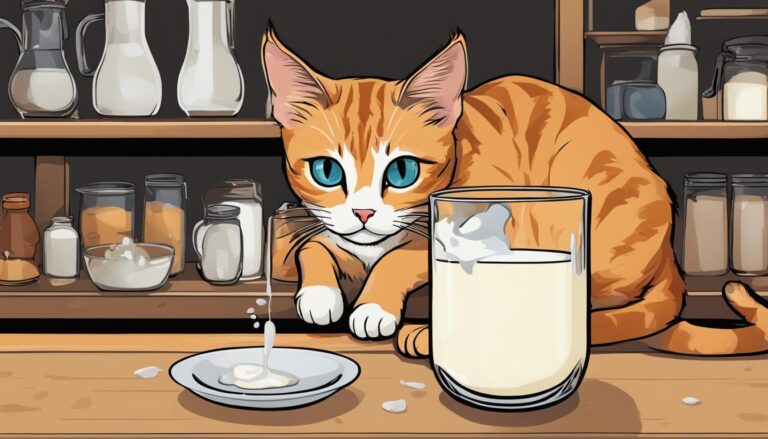Many cat owners wonder if it is safe to give their cats milk. However, the truth is that most cats cannot drink milk without experiencing negative side effects. Milk, especially cow’s milk, does not provide the necessary nutrients for feline health and can cause digestive issues due to lactose intolerance. In this guide, we will explore why cats cannot drink milk, alternatives to milk for cats, and the importance of proper cat nutrition.
https://www.youtube.com/watch?v=Z0ksC-6DBH8
Hal-hal penting yang dapat diambil:
- Milk is not safe for cats to consume due to lactose intolerance and lack of necessary nutrients.
- Alternative sources of nutrition such as special cat milk should be considered.
- Proper cat nutrition is essential for their overall health and well-being.
- Cow’s milk should be avoided for kittens after they are weaned.
- Water, wet canned food, bone broth, and tuna juice are better options for hydration.
Is Milk Healthy for Cats?
Milk is not healthy for cats to consume on a regular basis. Most cats are lactose intolerant, meaning they lack the enzyme lactase needed to digest the sugar in milk called lactose. Drinking milk can cause digestive issues such as diarrhea, vomiting, and abdominal pain in cats. Additionally, milk contains high amounts of fat, which can lead to weight gain and upset the cat’s stomach. It is best to avoid feeding milk to cats and opt for alternative sources of nutrition.
If you still want to give your cat some milk as a treat, there are alternative options available. Special cat milk can be purchased from pet stores or supermarkets, which usually have reduced lactose levels or are lactose-free. Goat milk is another option that may be easier for lactose-intolerant cats to digest, although it still contains lactose. Almond milk and soy milk are also safe for cats in small quantities, but it is important to avoid sweetened varieties and check for any added ingredients that may be harmful to cats.
In conclusion, while cats may enjoy the taste of milk, it is not recommended to give them milk as a regular treat or substitute for water. Most cats are lactose intolerant and can experience digestive issues when consuming milk. It is best to provide cats with alternative sources of nutrition and hydration, such as water, special cat milk, bone broth, and tuna juice. If you have any concerns about your cat’s diet, it is always advisable to consult with a veterinarian for personalized advice and guidance.
| Type of Milk | Lactose Content | Manfaat |
|---|---|---|
| Cow’s Milk | High lactose content | Not suitable for most cats |
| Special Cat Milk | Reduced or lactose-free | Alternative milk option for cats |
| Goat Milk | Contains lactose | Easier for some cats to digest |
| Almond Milk | Varies (check for added ingredients) | Safe in small quantities |
| Soy Milk | Varies (check for added ingredients) | Safe in small quantities |
Can Kittens Drink Milk?
Kittens naturally drink their mother’s milk until they are weaned at around four weeks old. This early phase is crucial for their growth and development, as mother’s milk provides essential nutrients and antibodies that support their immune system. However, once they reach this stage, kittens gradually lose the ability to digest the sugar, lactose, found in milk. Feeding them cow’s milk, or any other type of milk meant for human consumption, can lead to digestive issues and discomfort.
While it may be necessary to bottle-feed kittens in certain situations such as orphaned or rejected kittens, cow’s milk should be avoided. Special kitten milk formulas, available at pet stores, are specifically designed to provide the necessary nutrients for their growth. These formulas are fortified with essential vitamins and minerals, making them a suitable substitute for mother’s milk. It is important to follow the instructions provided on the formula packaging and consult a veterinarian for guidance on feeding schedules and quantities.
Feeding milk to kittens requires proper knowledge and care to ensure their well-being. Kittens have unique dietary needs as they grow, and providing them with the right nutrition is essential. Along with special kitten milk, introducing solid foods gradually and following a veterinarian’s guidance is crucial for their healthy development. As they transition to solid food, it is important to choose high-quality, age-appropriate kitten food that meets their nutritional requirements.

What Types of Milk Can Cats Drink?
If you still want to treat your cat to some milk, there are alternative options available. While cow’s milk is not suitable for cats due to lactose intolerance, there are other types of milk that cats can consume in moderation.
One option is goat milk. Goat milk contains less lactose than cow’s milk, making it easier for lactose-intolerant cats to digest. However, it is still important to introduce goat milk slowly and monitor your cat’s reaction to ensure it agrees with their digestive system.
Another alternative is almond milk or soy milk. These plant-based milk alternatives can be safe for cats to consume in small quantities. However, it is crucial to choose unsweetened varieties and check for any added ingredients that may be harmful to cats.
Types of Milk for Cats
| Milk Type | Suitability for Cats | Notes |
|---|---|---|
| Goat Milk | Safe in moderation | Contains less lactose than cow’s milk |
| Almond Milk | Safe in small quantities | Choose unsweetened varieties |
| Soy Milk | Safe in small quantities | Choose unsweetened varieties |
Remember, milk should never replace water in a cat’s diet. Water is essential for their hydration and overall well-being. If you have any concerns about your cat’s diet or which milk alternative is best for them, it is always recommended to consult with your veterinarian for personalized advice.

What Can Cats Drink Instead of Milk?
When it comes to keeping your cat hydrated, water is the best choice. Cats have a low thirst drive, so it’s important to encourage them to drink enough water to maintain their overall health. If your cat is not a fan of plain water, there are alternatives you can try to ensure they stay hydrated.
Bone broth is a nutritious option that can be beneficial for cats. It is rich in collagen, minerals, and amino acids, which can support their digestive health and boost their immune system. You can make your own bone broth using chicken or beef bones, or purchase pre-made bone broth specifically formulated for cats.
Tuna juice is another option that can entice cats to drink. It is important to use tuna in water rather than oil to avoid excessive fat intake. Tuna juice can be poured over your cat’s food or offered as a separate treat to ensure they consume enough fluids.
Special cat milk is also available as an alternative to regular dairy milk. These specially formulated milks have reduced lactose levels or are lactose-free, making them easier for cats to digest. They provide a tasty option for cats that enjoy the taste of milk without the negative side effects.
Table: Alternatives to Milk for Cats
| Alternative | Manfaat |
|---|---|
| Bone broth | – Rich in nutrients – Supports digestive health – Boosts the immune system |
| Tuna juice | – Entices cats to drink – Can be poured over food or offered as a treat |
| Special cat milk | – Reduced lactose levels or lactose-free – Tasty option for cats |
It is important to note that these alternatives should complement your cat’s diet and not replace their primary source of nutrition. Cats have specific dietary requirements, and their main source of food should come from a balanced diet that meets their nutritional needs. If you have any concerns about your cat’s diet or hydration, it is always best to consult with a veterinarian for personalized advice and guidance.

In summary, while some dairy products may be tolerated by certain cats, it is crucial to monitor their response and consult with a veterinarian to ensure they are suitable for your cat’s individual dietary needs. Remember that water is the best source of hydration for cats, and there are alternative treats and supplements available that are specifically formulated to support their nutritional requirements.
Kesimpulan
In conclusion, while cats may enjoy the taste of milk, it is not recommended to give them milk as a regular treat or substitute for water. Most cats are lactose intolerant and can experience digestive issues when consuming milk. It is best to provide cats with alternative sources of nutrition and hydration, such as water, special cat milk, bone broth, and tuna juice.
If you have any concerns about your cat’s diet, it is always advisable to consult with a veterinarian for personalized advice and guidance.




